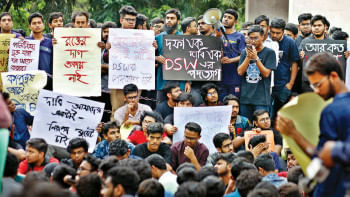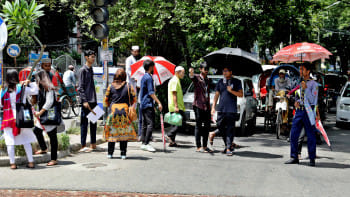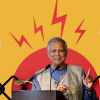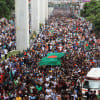How the new leadership can best utilise this fresh start

With the swearing-in of a new interim government of Bangladesh, following a truly phenomenal student-led mass revolution, Bangladesh has effectively entered a new social contract. There will be time enough in the coming days to analyse the full significance of this historic moment that Bangladesh, and indeed the whole world, is witnessing. For now, however, time is of the essence, and every stakeholder invested in a fresh start for nation building must be girded for the tough road that lies ahead. This is a moment that calls for decisive action and precise, intentional leadership to set the course and the tone for Bangladesh's path forward.
There is no denying that the expected deliverables from this new government is mountain high. From addressing immediate concerns such as restoring law and order, and economic and infrastructural recovery, to reclaiming and reforming the judiciary, and critical state institutions and commissions such as the National Human Rights Commission and Anti-Corruption Commission, amongst others, must be addressed with the utmost urgency.
For this government, which will have perhaps only a sliver of a honeymoon period, striking a balance between the urgent and the important in its prioritisation agenda will be one of the first challenges to overcome. For a sustained reform agenda, the government will have to adopt parallel initiatives and go beyond the tangible outcomes around law enforcement, business and the economy, communications, and bricks and mortar development. It will be in the delivery on the more intangible outcomes, that the expectations of citizens who have made immeasurable sacrifices to give Bangladesh this fresh start, will be assessed. The bedrock of these expectations is for Bangladesh to recover its soul. It is to give democracy, the rule of law, and the high ideals of the constitution to establish an equity-based and justice-centric society, the chance to flourish at last.
Translating these idealistic aspirations, especially within this environment of urgency, runs the threat of getting lost or deprioritised in the din of day-to-day minutiae of governance. In order to keep these ideals on the radar of governance, Bangladesh's new leadership need to pay attention and reflect on a few preliminary touch points, as it takes on the mantle of hope for nearly 180 million Bangladeshis.
It is time to go back to the drawing board. For a nation charting its course into the future, it is essential to revisit, as a matter of course, lessons from the past. Keeping an eye on the rearview mirror of political history sheds light not only on mistakes, missteps and missed opportunities but also provide sharp insights into the intent, actions and positioning of the various actors and factors that result in particular outcomes. Going back to the tenets of the original Constitution of Bangladesh, particularly its Preamble, will serve our leaders well in steering Bangladesh in its journey back to its raison d'etre. This is essential, irrespective of any future exercises around reframing the constitution.
The Constituent Assembly debates (1971-1973) provide important signposts for Bangladesh's new leadership on how to resolve challenges that have lingered over decades, and that eroded the core values of a cohesive society. From addressing critically important issues of secularism and pluralism, to the limits of power of each organ of the state and the independence of the judiciary, to protection against excessive executive power of the prime minister, and proportional representation in the legislature, the lessons of the past must guide the legacy of the future.
The interim government will need to be aware of echo chambers. In about three months hence, the operational and administrative wheels of governance will have set in. From the very earliest moments, mechanisms will need to be built into daily operations against complacency. Recognised best practices must be adopted against solidifying actions or decisions based on opinions that only reinforce the leadership's own positions. Processes that allow for regular pulse-checks with stakeholders and dissenting opinions, and those that ensure room for course correction, are some of the best antidotes against tunnel vision and mission drift.
It is also the time to prioritise truth, reconciliation, and healing. The pace at which individuals or nations heal from the scars and trauma of wrongdoing, violence and injustice, vary greatly. They depend on many factors and circumstances, both internal and external. The immediate effects of the mass uprising that Bangladesh is beginning to emerge from is but the ultimate protest against the vortex of state sanctioned human rights violations over decades that has included killings, torture, disappearances, suppression of dissent, abuse of power and an overall reign of terror and impunity.
In an ideal scenario, every perpetrator of every human rights violation should be brought to justice. The ground reality is that this ideal could be quite hard to achieve, especially if it is aimed to be achieved within a reasonably short period of time. One only needs to go through the bottlenecks and challenges in the existing criminal justice system of Bangladesh, as outlined in the Bangladesh Justice Audit, to understand why most victims and victim families will not receive justice within their lifetime. An overhaul of the criminal justice system may not be realisable within a limited time frame to address the large number of cases that will inevitably be lodged.
Whereas every effort must continue to be taken by the state to document every criminal offence and prosecute every perpetrator accordingly; the interim government should also check the pulse of citizens to assess whether the establishment of a Truth and Reconciliation Commission would be acceptable or feasible as a forum and process of justice. There are well known examples globally of similar such redressal mechanisms. Commissions set up, for example, in South Africa, Rwanda, Canada, or Australia, have helped to uncover the truth about human rights violations by gathering evidence and uncovering information—from both victims and perpetrators—on past crimes, to help heal the country and bring about a reconciliation of its people. These have focused on restorative rather than retributive justice as an outcome. If a similar mechanism can be considered for Bangladesh, national unity and intergenerational healing could be part of its objectives. It could go a long way to bring closure for a nation suffering from deep and open wounds and long deprived of timely, transparent and effective justice.
In honouring the aspirations of the student-led revolution that has ushered in a fresh start for Bangladesh, our new leadership must demonstrate a truly inclusive and intersectional approach to decision making, and in policy adoption and implementation. This will mean that those in whose name decisions are taken, particularly underrepresented and marginalised communities, including women, religious, ethnic and linguistic minorities, and people living with disabilities, must have a seat at the table. The voices and the choices of minorities across all social markers of age, sex, belief, class, profession, location or civil status must be an integral part of any decision that directly or indirectly affect these communities. What constitutes "national interest" must be re-defined to include the historically excluded. Inclusion in decision-making and in the spaces for equal or equitable opportunities and outcomes must be unshackled from tokenism.
To take a current example, it is disheartening to note that, despite high levels of participation, sacrifice and visibility of women and girls at the frontline and at the heart of the revolution, women's representation or visibility in the post revolution decisions around the new governance framework has been almost non-existent. This must be rectified immediately.
Indeed, the success of this revolution rests on the blood, sacrifice and participation of every category of citizens. Going forward, every effort needs to be taken to avoid historic mistakes of sidelining or excluding the historically marginalised contributors to state reform.
The adoption of an Anti-Discrimination Act that genuinely addresses the diversity and plurality of identities and experiences of all Bangladeshis, is one step to rectify historical exclusions and wrongs. But it cannot be the only mechanism. Inclusion must become an inherent part of democratic policy and practice.
Not many nations have the opportunity to make a fresh start in the right direction, such as Bangladesh does today. This opportunity has come at very great cost. From now onwards, every action taken by Bangladesh's new leadership, and indeed every citizen, will be indebted to and measured against this supreme sacrifice.
Dr Faustina Pereira is an advocate at the Bangladesh Supreme Court.
Views expressed in this article are the author's own.
Follow The Daily Star Opinion on Facebook for the latest opinions, commentaries and analyses by experts and professionals. To contribute your article or letter to The Daily Star Opinion, see our guidelines for submission.

 For all latest news, follow The Daily Star's Google News channel.
For all latest news, follow The Daily Star's Google News channel. 











Comments